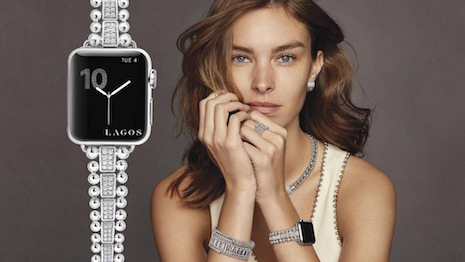
Michael Kors' produces smartwatches. Image credit: Michael Kors
By Mickey Alam Khan
Smartwatch sales are on the rise but with an extreme lack of diversity, as only the top three brands make up 88 percent of total sales.
While luxury brands have attempted to enter smartwatch territory, their market share is still small. According to a new NPD report, Apple, Samsung and Fitbit control 88 percent of all sales, but companies such as Fossil and Garmin are hoping to catch up.
“Over the last 18 months smartwatch sales gained strong momentum, proving the naysayers, who didn’t think the category could achieve mainstream acceptance, had potentially judged too soon,” said Weston Henderek, director, industry analyst for NPD Connected Intelligence.
Growing sophistication
The new report shows that 16 percent of adults own a smartwatch, growing 4 percent since the same time period a year prior.
Younger adults, aged 18 to 34, are pushing the market, making up 23 percent of the smartwatch market.
 Lagos Apple Watch strap. Image credit: Lagos
Lagos Apple Watch strap. Image credit: Lagos
As technology geared towards health within these products continues to grow and gain sophistication, older segments are likely to be more interested in owning a smartwatch. Apple’s Series 4 watch is grabbing attention with its many innovative health features, such as detecting something of concern and even sensing falls with emergency SOS.
This means that elderly consumers who are concerned with incidents happening while alone will be able to leverage something such as an Apple Watch for ease of mind, instead of the traditional bulky buttons that hang around the neck. The watch also includes the ability to generate an ECG, similar to a single-lead electrocardiogram.
 The Apple Watch and iPhones have been associated with luxury goods for years. Image credit: Hermès
The Apple Watch and iPhones have been associated with luxury goods for years. Image credit: Hermès
Smartwatches are also evolving in other sectors, such as home automation. Fifteen percent of smartwatch owners have stated they use their devices to control the IoT in their homes.
Luxury and smartwatches
Luxury watchmakers have attempted to penetrate the smartwatch market, but consumers are flocking to those that specialize in the sector, making it better for these brands to partner for various initiatives rather than produce one themselves.
For instance, Hermès has teamed with Apple to release branded versions of the Apple Watch, including special straps and faces (
see story).
By taking a fashion-first approach to smartwatch design, the technologically advanced timepiece category has seen consumer interest steadily increase.
As early as 2015, when smartwatches were still seen as a disruptor rather than a sector draw, experts agreed that the wearables concept required a combination of fashion and function if consumers were to be interested. While tech designs, such as Apple Watch, do take inspiration from traditional timepieces, smartwatches that marry true analog qualities with functionality are growing in popularity and demand (
see story).
Experts are anticipating a crucial shift in luxury retail towards voice assistance, but as of right now there is a slim market for purchasing through speech.
The "Reimagining Commerce: Global Findings" report from Episerver shows that around 60 percent of voice-activated artificial intelligence assistant owners do not use them to search for products and fewer actually purchase anything. In addition, smartwatches are also failing to gain much market share of product browsing or buying (
see story).
“The ability to be truly connected via built-in LTE without the need to have a smartphone nearby proved to be a tipping point for consumers, as they now recognize the value in being able to complete a wide range of tasks on the device including receiving notifications, messaging, accessing smart home controls, and more,” Mr. Henderek said.
 Michael Kors' produces smartwatches. Image credit: Michael Kors
Michael Kors' produces smartwatches. Image credit: Michael Kors
 Lagos Apple Watch strap. Image credit: Lagos
Lagos Apple Watch strap. Image credit: Lagos The Apple Watch and iPhones have been associated with luxury goods for years. Image credit: Hermès
The Apple Watch and iPhones have been associated with luxury goods for years. Image credit: Hermès